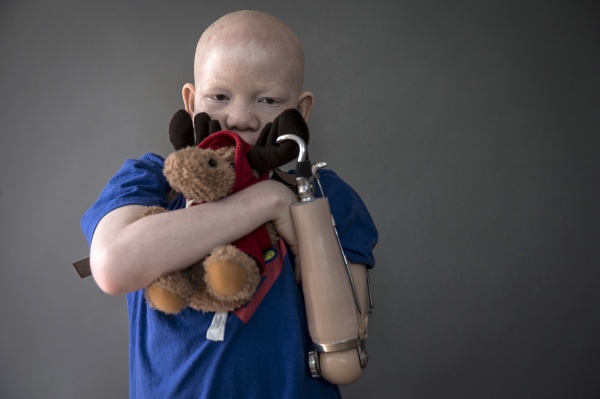Increased funding and awareness campaigns are helping to slow the rates of violence against people with albinism in Africa, according to officials and campaigners.
In some countries in sub-Saharan Africa, people with albinism – a lack of pigmentation in the skin, hair and eyes – are attacked for their body parts which are prized in witchcraft for use as lucky charms or in magic potions.

12-year-old Mwigulu Matonage Magesa from Tanzania poses for a portrait with a stuffed animal that he says makes him feel safe at night and that he sleeps with, in the Staten Island borough of New York, on 21st September, 2015. PICTURE: REUTERS/Carlo Allegri
But funding and campaigns to put the plight of albinos in the spotlight was starting to pay off, said Peter Ash, founder of Under The Same Sun, a charity for people with albinism, with attacks in Tanzania dropping to six last year from 20 in 2010.
“For us, that’s progress,” Ash told a United Nations event last week to mark the fifth annual International Albinism Awareness Day.
Isaac Mwaura, the first member of Kenya’s parliament with albinism, said the annual day was worth celebrating for once.
Rising reports of ritual and witchcraft-related killings for body parts in countries such as Tanzania, Malawi and Burundi in recent years had prompted the United Nations to appoint a special expert to protect people with albinism.
“[Before] there was nothing to celebrate,” said Mwaura.
But Stephan Bognar, executive director of the New York Dermatology Group Foundation which has launched a global awareness campaign, cautioned that the lives of people with albinism remained at high risk.
“Albinism, poverty, extreme discrimination go hand in hand in many countries,” he said, calling for more dermatologists to care for the albino population.
Kenya has spent about $7 million to provide health care, protective clothing and free sunscreen to people with albinism, according to its permanent representative at the United Nations.
Malawi has toughened its laws and punishments, waged public awareness programs, built a database of people with albinism and plans to build nearly 200 protective homes nationwide, said Perks Ligoya, Malawi’s ambassador to the United Nations.
Tanzanian Mwigulu Magesa, 15, who lost his left arm in an attack five years ago and lives in a protected boarding school, traveled from Tanzania to the UN event to speak, aided by Under The Same Sun, but was too shy when his moment arrived.
But speaking a day before to the Thomson Reuters Foundation, Magesa said he relished his freedom in New York, where he was staying with the Global Medical Relief Fund, a charity that aids children wounded in conflict.
“I can walk from here to the beach, but in Tanzania, I can’t go by myself to the beach. There is not enough security for people with albinism,” he said.
Albinism is a congenital disorder affecting about one in 20,000 people worldwide but is more common in sub-Saharan Africa. It affects about one Tanzanian in 1,400.






